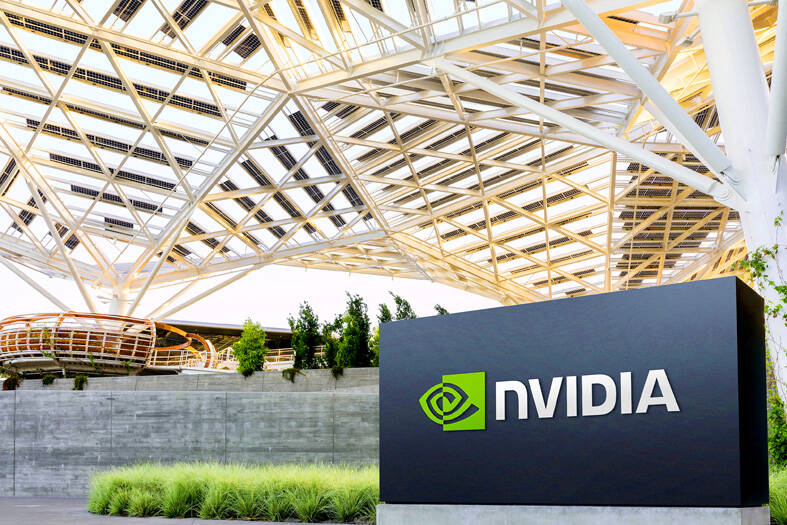US chipmaker Nvidia Corp’s plans to sell technology to China’s Huawei Technologies Co (華為) would be thwarted if the US government proceeds with a proposal to further restrict shipments to the blacklisted company, a draft report by a US government contractor shows.
The administration of US President Joe Biden has been considering limiting the items it authorizes US companies to ship to telecoms equipment giant Huawei, which was added to a US trade blacklist in 2019, but which continues to receive billions of US dollars in US goods under a special plan implemented by the administration of former US president Donald Trump.
“The proposed 2023 amendment of [the US Department of Commerce’s] licensing will likely have a high economic impact on Nvidia,” a draft report seen by Reuters said, referring to the company’s “pending license value.”

Photo: Reuters
Nvidia’s plans to sell to Huawei have not been previously reported.
“The China market presents a significant opportunity for the US semiconductor industry. While we are unable to comment on any pending license requests, we work with customers and partners worldwide to comply with all applicable export controls and meet market demand,” a Nvidia spokesperson said, declining to comment on the document.
A senior US Department of State official said the document was a preliminary draft prepared by a contractor, and that the department “would not have approved of the report in its current form.”
The government “has written and contracted multiple reports on this subject, based on different contingencies, which arrive at very different conclusions,” they said.
The White House and commerce department declined to comment. Huawei did not respond to a request for comment.
The document shows the Biden administration is seeking to assess the impact on US companies of proposed Huawei policy changes before imposing rules that could crimp projected revenue streams at a time when the tech industry is already reeling.
It also provides unusual insight into the politically sensitive question of which US companies are seeking business ties to Huawei, one of Washington’s most penalized Chinese companies.
The report suggested Qualcomm Inc would likely suffer a “moderate economic impact” from the change in policy, in contrast with Huawei.
However, the loss of access to Qualcomm’s modem chips would have a bigger impact on Huawei, the report forecast, as Huawei “relies heavily on Qualcomm’s modem chips to support its smartphone offering.”

Zhang Yazhou was sitting in the passenger seat of her Tesla Model 3 when she said she heard her father’s panicked voice: The brakes do not work. Approaching a red light, her father swerved around two cars before plowing into a sport utility vehicle and a sedan, and crashing into a large concrete barrier. Stunned, Zhang gazed at the deflating airbag in front of her. She could never have imagined what was to come: Tesla Inc sued her for defamation for complaining publicly about the vehicles brakes — and won. A Chinese court ordered Zhang to pay more than US$23,000 in

Taiwan Semiconductor Manufacturing Co (TSMC, 台積電) yesterday said that its investment plan in Arizona is going according to schedule, following a local media report claiming that the company is planning to break ground on its third wafer fab in the US in June. In a statement, TSMC said it does not comment on market speculation, but that its investments in Arizona are proceeding well. TSMC is investing more than US$65 billion in Arizona to build three advanced wafer fabs. The first one has started production using the 4-nanometer (nm) process, while the second one would start mass production using the

A TAIWAN DEAL: TSMC is in early talks to fully operate Intel’s US semiconductor factories in a deal first raised by Trump officials, but Intel’s interest is uncertain Broadcom Inc has had informal talks with its advisers about making a bid for Intel Corp’s chip-design and marketing business, the Wall Street Journal reported, citing people familiar with the matter. Nothing has been submitted to Intel and Broadcom could decide not to pursue a deal, according to the Journal. Bloomberg News earlier reported that Taiwan Semiconductor Manufacturing Co (TSMC, 台積電) is in early talks for a controlling stake in Intel’s factories at the request of officials at US President Donald Trump’s administration, as the president looks to boost US manufacturing and maintain the country’s leadership in critical technologies. Trump officials raised the

From George Clooney to LeBron James, celebrities in the US have cashed in on tequila’s soaring popularity, but in Mexico, producers of the agave plant used to make the country’s most famous liquor are nursing a nasty hangover. Instead of bringing a long period of prosperity for farmers of the spiky succulent, the tequila boom has created a supply glut that sent agave prices slumping. Mexican tequila exports surged from 224 million liters in 2018 to a record 402 million last year, according to the Tequila Regulatory Council, which oversees qualification for the internationally recognized denomination of origin label. The US, Germany, Spain,